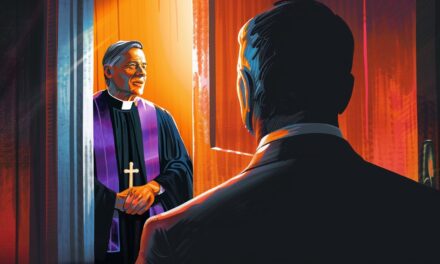In these interesting times in our world, I’ve heard many talk about hope. How do we have hope amidst uncertainty, changing world order, and the rise of authoritarian power? As Christians, we are people of hope, but that does not mean a faux optimism. While we do say that all will be well, it is understood as a deep trust in a God who knows the human heart and sees the “larger frame,” as Richard Rohr calls it. So how are we to be a people of hope who trust in the coming of God’s kingdom?
Abraham and Sarah: Trusting Beyond the Horizon
When we look back to the story of Abraham and Sarah, the father and mother of our faith, we see them set out from their homeland in Ur to an unknown place. They must have been responding to a desire that God placed in their heart—a desire that God also had—in a promised land filled with Abraham and Sarah’s descendants. But here’s the rub: they would never see the fulfilment of this promise. In fact, Abraham learned to wait from the very beginning of his encounter with God. It took twenty-five years for Isaac to come along after God’s promise to Abraham and Sarah of a son. “Trust in the slow work of God,” Pierre Teilhard de Chardin implores us.
 And when God asked Abraham to sacrifice Isaac—who was his hope for the descendants promised by God—he followed in trust. I’ve always struggled with this story. But the letter to the Hebrews says, “[Abraham] reasoned that God was able to raise even from the dead, and he received Isaac back as a symbol.” He trusted that God’s desire was deeper than his own understanding and Isaac became a symbol of this trust and hope amidst the waiting.
And when God asked Abraham to sacrifice Isaac—who was his hope for the descendants promised by God—he followed in trust. I’ve always struggled with this story. But the letter to the Hebrews says, “[Abraham] reasoned that God was able to raise even from the dead, and he received Isaac back as a symbol.” He trusted that God’s desire was deeper than his own understanding and Isaac became a symbol of this trust and hope amidst the waiting.
Abraham’s most active moment (leaving home) and his most surrendering moment (offering Isaac) both express the same patient hope. But Abraham never saw the promised land; Moses never entered it. This reminds us that through our desires we are participating in something larger than our individual lives, in the larger desire of God.
Hope as the Spirit of Desire
So hope is not the expectation that things will turn out the way we want them or expect them to. Rather, hope is more like the spirit in which we express our desires and live them out, knowing that the true desire is the one in God’s heart. Our desires, when aligned with God’s, become part of a cosmic hope that spans generations. This is the spirituality of the long view.
Saint Ignatius often warned that our hastiness to reach the end is a sign of the evil spirit. In a letter to zealous young Jesuits, Ignatius warns against excessive fervour. “The horse worn out in the first days does not finish the journey,” he says. And, “wealth gathered in haste will dwindle.” This does not mean we are passive or tepid. Abraham and Sarah were neither. They show us a patient fervour that is sustained over the long haul: radical departure from the security of their homeland and patient endurance without seeing the end. Is this not what patient hope means?
Prayer: The School of Patient Hope
Can we hold our desires lightly with open hands, trusting that they are grafted into the larger dreams and hopes of God? How do we discern between holy desire and impatient grasping? In prayer, perhaps, where our desires and our hope meet. When we bring our longings to God—for healing, for justice, for peace in our world—we learn to distinguish between demanding outcomes and offering our hearts. The deepest desires of our soul, for goodness, wholeness, redemption, are ultimately desires for God. Prayer becomes the school of patient hope, teaching us to hold our desires as offerings rather than expectations, trusting that even when we cannot see the way forward, God is faithful to the larger promise. And this spirit of hope recognizes that the future is open, not closed. It’s open to new possibilities and even newer desires, but we must always wait for that future.
Related posts:
- Freedom: Trusting That All Will Be Well
- Who You Are: Moana’s Call to Discernment
- The Falling Away of the Old
Listen to the podcast version of this post…








